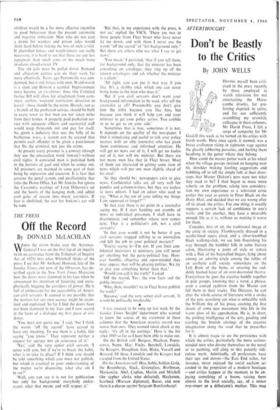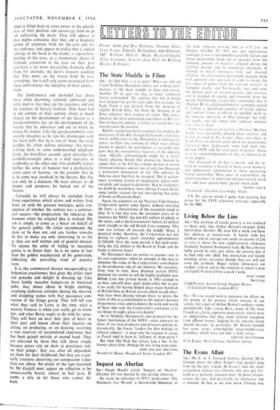Don't be Beastly to the Critics
AFTERTHOUGHT
By JOHN WELLS
How could the master potter work at his wheel when the village gossips insisted on hanging over his shoulder making footling suggestions and hobbling off to tell the simple folk at their door- steps that Master Dickon's pots were not what they used to be? I then began to muse more soberly on the problem, taking into considera- tion my own experience as a television critic earlier this year as curate to Peter Black on the Daily Mail, and decided that we are wrong after all to attack the critics. For one thing, it usually suggests a certain lack of confidence in one's work; and for another, they have a miserable enough life as it is, without us making it worse for them.
Consider, first of all, the traditional image of the critic in society. Flamboyantly dressed in a scarlet-lined opera cloak and a silver-knobbed black walking-stick, we see him flourishing his way through the humbler folk in some literary salon, illustrating a point of style or syntax with a flick of his bejewelled fingers, lying about among an adoring circle among the tables of an aesthetic café society somewhere on the Left Bank of the Seine, or entering the sud- denly hushed foyer of an over-decorated theatre. Everywhere he goes the creative huddle together in pale groups, knowing that a word, a phrase, even a cocked eyebrow from the Master can fell them in their tracks. The Dictator, he can alter the whole course of literature with a stroke of the pen, scorching out what is unhealthy with the brilliant fire of his prose, coaxing the first shoots of some new movement into life in the warm glow of his approbation. He is, in short, the guiding intelligence of the arts, goading and cajoling the brutish stirrings of the creative imagination along the road that he prescribes for it.
It is almost tragic to see the persistence with which the critics, particularly the more serious- minded men who devote themselves to the novel or to painting, still cling to this patently ridi- culous myth. Admittedly, all professions have their ups and downs—the East End tailor, for instance, never enjoyed the social acclaim ac- corded to the proprietor of a modern boutique —and critics happen at the moment to be en- joying something of a boom, raising them almost to the level socially, say, of a minor pop-singer or a debutante's mother. This may
tend to blind them to some extent to the ghastli- ness of their position and encourage them to go on cultivating the myth. They still appear at first nights conscious that they are a magnetic centre of attention, both for the cast and for the audience, and appear to realise that a sudden sinking of the head in the hands, a supercilious picking of the nose, or a momentary gleam of frenzied animation in the eyes on their part can have a far more devastating dramatic effect than, for example, the hero's trousers catching fire. This must, on the lowest level, be very rewarding: but it still only serves to conceal from these unfortunates the indignity of their employ- ment.
The fundamental and shameful fact about these often charming, talented, cultivated and witty men is that they are the creatures and not the creators of literary fashion. They have had in the context of their century about as much impact on the development of the theatre as a gossip-columnist has on the development of the society that he advertises and out of which he makes his money. Like the gossip-columnist, who secretly imagines as he sips his champagne with the local nobs that he is one of them, the critic justifies his often tedious existence—the nerve- racking dash to some undismantled telephone kiosk, the breathless seconds spent dictating his carefully-wrought jokes to a dull operative in earphones at the other end, who probably enjoys neither his sense of humour nor a particularly acute sense of hearing—on the grounds that he is in some way involved in the theatre. But this can only be a delusion. He must always, to all intents and purposes, be locked out of the theatre.
Certainly he will always be excluded from those experiences which actors and writers look back on with the greatest nostalgia, quite irre- spective of whether the venture was a commer- cial success—the preparation, the rehearsal, the moment when the original idea is realised. His job is simply to come as a buyer on behalf of the general public. He either recommends the show or he does not, and any further remarks he has to make are only interesting in so far as they are well written and of general interest. To accuse the critic of failing to recognise genius is to flatter him: he is no more in fact than the golden weathercock of his generation, indicating the prevailing wind of popular taste.
It is this commercial interest masquerading as bohemian creativeness that gives the critics their sad panache and delight in dressing up. Like those faintly macabre hangers-on in theatrical pubs, they mince about in bright clothing, assuming elaborate attitudes during the interval, and dropping names with that passionate con- viction of the fringe gossip. They will tell you what they said to Larry at the time, what a sweetie Vanessa is when you really get to know her, and what Barry ought to do with his spear. They will bore on over their pint of bitter or their port and lemon about their theories on acting, on producing, or on dancing, assuming a vast reservoir of accumulated experience that has been gained entirely at second hand. They are tolerated by those they talk about simply because actors rely on them as prostitutes rely on their pimps: they are, after all, dependent on them for their livelihood; but they are essen- tially creatures deserving our compassion rather than our abuse. An attack of the type launched by Mr Gaskill must appear on reflection to be unnecessarily brutal, almost in bad taste. It seems a pity to hit those who cannot hit back.



































 Previous page
Previous page